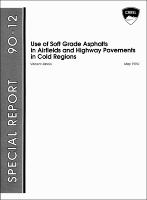Please use this identifier to cite or link to this item:
https://hdl.handle.net/11681/12060| Title: | Use of soft grade asphalts in airfields and highway pavements in cold regions |
| Authors: | United States. Army. Office of the Chief of Engineers U.S. Department of Transportation United States. Federal Aviation Administration Janoo, Vincent C. |
| Keywords: | Asphalt concrete Cold regions pavements Pavement cracking Pavement rutting Soft grade asphalts |
| Publisher: | Cold Regions Research and Engineering Laboratory (U.S.) Engineer Research and Development Center (U.S.) |
| Series/Report no.: | Special report (Cold Regions Research and Engineering Laboratory (U.S.)) ; 90-12. |
| Description: | Special Report Abstract: Soft grades of asphalt cement are being used for controlling low temperature cracking in some parts of the northern regions of the United States and in Canada. The U.S. Army Corps of Engineers (COE) specified softer asphalts for use in cold regions (ETL 1110-3-369) dated November 1976; at present, the COE uses the penetration viscosity number (PVN) as a measure of the temperature susceptibility of the asphalt. A minimum PVN of -0.5 is specified for moderately cold areas and -0.2 in regions where the design freezing index is greater than 39900*C-hr. Field studies have been conducted that clearly show the benefits of using softer grades of asphalt for minimizing low temperature cracking in cold regions; however, field studies relating rutting to asphalt type are rare. A major concern is whether or not pavements constructed with softer grades of asphalt are more susceptible to rutting during the hot summer months. A field study was conducted by CRREL to gather information on the use of soft grades of asphalt (AC 2.5, AC 5 and AC 10) and their associated pavement performance. An attempt was made to compare the COE specifications with State DOT specifications for these soft grades of asphalt. The influence of the asphalts studied, and the preliminary results of this field program are presented in this report. For the longer term objectives of this study new or reconstructed pavements in various parts of the country will be monitored for both low temperature cracking and rutting. |
| Rights: | Approved for Public Release, Distribution is Unlimited |
| URI: | http://hdl.handle.net/11681/12060 |
| Appears in Collections: | Special Report |
Files in This Item:
| File | Description | Size | Format | |
|---|---|---|---|---|
| SR-90-12.pdf | 12.16 MB | Adobe PDF |  View/Open |